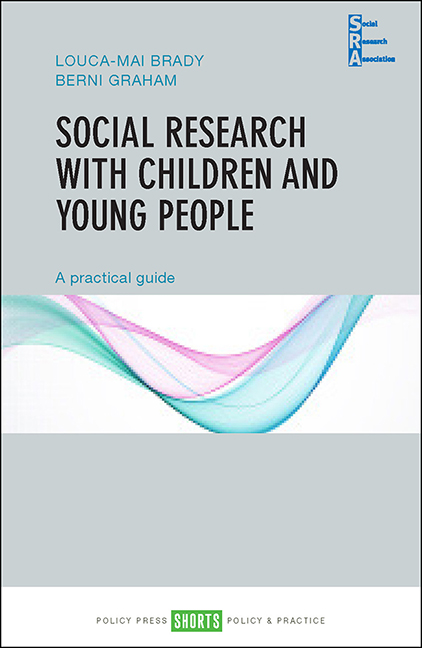Book contents
- Frontmatter
- Contents
- List of illustrations
- Notes on authors
- 1 Introduction
- 2 The context for social research with children and young people
- 3 Involving children and young people in research
- 4 Ethical considerations
- 5 Designing appropriate methods for children and young people
- 6 Conclusions
- Bibliography
- Index
- Social Research Association Shorts
3 - Involving children and young people in research
Published online by Cambridge University Press: 13 April 2022
- Frontmatter
- Contents
- List of illustrations
- Notes on authors
- 1 Introduction
- 2 The context for social research with children and young people
- 3 Involving children and young people in research
- 4 Ethical considerations
- 5 Designing appropriate methods for children and young people
- 6 Conclusions
- Bibliography
- Index
- Social Research Association Shorts
Summary
Introduction
There are two principal arguments for involving children and young people in research: a rights-based moral argument that it is the ‘right’ thing to do; and an impact, or evidence-based, argument that involvement has benefits for the children and young people participating, for research and for the services and policies which draw on this research evidence. As discussed in Chapter Two, the United Nations (UN) Convention on the Rights of the Child (UN, 1989) established international recognition that all children have a right to have a say in decisions that affect them. Children's rights and the changing views of the nature of childhood have been reflected, to some extent, in increasing interest in children's and young people's involvement in research (for example, Brady, 2017; Kellet, 2005; Powell and Smith, 2009) both as sources of data and the focus of this chapter, through their active involvement in the research process. In a General Comment on Article 12, children's right to have a say on matters which affect them (see Chapter Two) the UN Committee on the Rights of the Child (UNCRC) outlines how this right should be applied:
A widespread practice has emerged in recent years, which has been broadly conceptualized as ‘participation’. This term has evolved and is now widely used to describe ongoing processes, which include information-sharing and dialogue between children and adults based on mutual respect, and in which children can learn how their views and those of adults are taken into account and shape the outcome of such processes. (UNCRC, 2009, p 3, emphasis added)
Involving those who are the focus of research has been found to have a positive impact on what is researched, how research is conducted and the impact of research findings on services and in the lives of those involved (Brett et al, 2014; Staley, 2009). Involvement should lead to research, and ultimately services, that better reflect young people's priorities and concerns (Brady et al, 2018b; Fleming and Boeck, 2012). In the past less attention has been paid to the experiences and impact of involving children and young people than to the involvement of adults in research (Bird et al, 2013), and this area is still developing (Parsons et al, 2018).
- Type
- Chapter
- Information
- Social Research with Children and Young PeopleA Practical Guide, pp. 23 - 58Publisher: Bristol University PressPrint publication year: 2018

